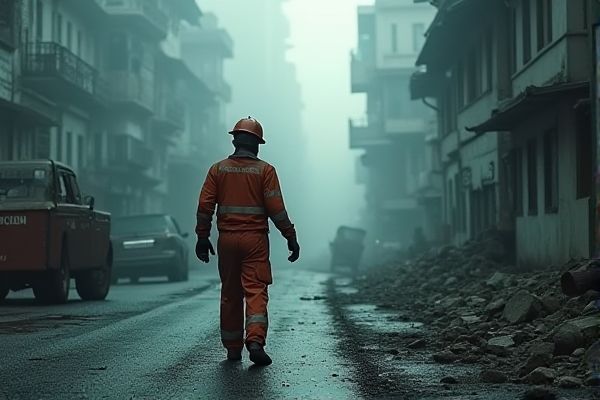
Mining remains one of the most hazardous jobs in India, exposing workers to risks such as cave-ins, toxic gas inhalation, and heavy machinery accidents. Construction laborers face dangers from falling objects, scaffolding collapses, and electrical hazards, often working in challenging environments. Agriculture, particularly in pesticide application and equipment operation, poses significant health risks due to exposure to chemicals and machinery accidents. Fishing, especially deep-sea fishing, involves threats from harsh weather conditions and the possibility of drowning, making it a perilous profession.
Job Description
In India, some of the riskiest jobs include mining, construction, and deep-sea fishing, where professionals face hazards like accidents, exposure to harmful substances, and precarious working conditions. Many workers in the mining sector operate heavy machinery in unstable environments, significantly increasing their risk of injury or fatal accidents. Construction workers often deal with heights and potentially unsafe materials, making safety protocols crucial for their well-being. Deep-sea fishing presents unique challenges, as fishermen navigate rough waters and unpredictable weather, which can lead to life-threatening situations.
Requirement
In India, some of the riskiest jobs include mining, construction, and firefighting. These professions often require physical stamina, technical skills, and adherence to safety protocols. Workers may need specialized training and certifications, particularly in mining and handling hazardous materials. Additionally, employers prioritize individuals who can operate heavy machinery or manage emergency situations effectively.
Salary and Perks Expected
In India, some of the riskiest jobs include commercial diving, mining, and construction work, often exposing individuals to hazardous conditions. These professions typically offer substantial salaries, with commercial divers earning between Rs50,000 to Rs1,00,000 per month, depending on the project and experience. Alongside competitive wages, many of these roles come with additional perks, such as health insurance, travel allowances, and performance bonuses. If you pursue one of these challenging careers, be prepared for rigorous safety training and adherence to safety protocols to mitigate risks while maximizing earning potential.
Similar Job Names
- Mining Engineer
- Construction Manager
- Firefighter
- Oil Rig Worker
- Logisticians
- Electrical Lineman
- Crane Operator
- Steel Worker
- Chemical Plant Operator
- Aviation Technician
- Fisherman
- Disaster Management Officer
- Security Personnel
- Wildlife Conservationist
- High-Altitude Worker
Job Expectation Concept
In India, the riskiest jobs encompass a range of industries, including construction, mining, and agriculture, where workers face significant hazards daily. Construction laborers often encounter falls, machinery accidents, and exposure to harmful substances. Agricultural workers may deal with dangerous equipment, pesticide exposure, and unpredictable weather, contributing to high injury rates. Understanding these risks is crucial for enhancing workplace safety standards and protecting workers' rights across the country.
Career Advantage and Weakness
Riskiest jobs in India, such as mining, construction, and certain agricultural roles, often offer higher salaries and benefits as compensation for the dangers involved. These positions can provide unique career advancement opportunities through skill enhancement and experience in challenging environments. However, the inherent risks, including accidents and health hazards, can lead to job insecurity and emotional stress. Understanding the balance between potential rewards and the dangers associated with these jobs is crucial for making informed career choices.
Important Thing Must Know
India has a diverse job market, with certain professions presenting higher risks due to various factors. Mining, for example, is one of the most dangerous occupations due to the potential for cave-ins and exposure to harmful substances. Construction workers also face significant hazards, leading to accidents and injuries from falls and equipment mishandling. The fishing industry presents risks associated with adverse weather conditions and sea-related accidents. Understanding these dangers is crucial for anyone considering a career in these fields, as safety precautions and proper training can mitigate some risks.
Alternative Career Options
In India, numerous career alternatives exist for individuals in high-risk occupations such as construction, mining, and offshore drilling. You can explore opportunities in fields like project management, where your skills in coordinating teams and resources can reduce safety hazards. The healthcare sector offers positions in occupational safety and health, ensuring workplace environments adhere to safety regulations and protocols. Additionally, roles in environmental consultancy allow for addressing risks associated with industrial activities, helping to promote sustainable practices across various sectors.
Companies List
- Oil and Natural Gas Corporation (ONGC)
- Coal India Limited
- National Thermal Power Corporation (NTPC)
- Steel Authority of India Limited (SAIL)
- Indian Railways
- Tata Steel
- Hindustan Aeronautics Limited (HAL)
- Larsen & Toubro
- Bharat Heavy Electricals Limited (BHEL)
- Essar Group
List of Ideal City
Mumbai offers numerous opportunities for high-risk jobs, particularly in the finance and entertainment sectors. In Delhi, the construction and security industries demand skilled professionals willing to embrace potential hazards. Another notable city is Bengaluru, which is known for its tech startups that often require employees to navigate unpredictable and high-stakes environments. Chennai also presents options in marine and offshore industries, where jobs can be both rewarding and dangerous.
 jobs-india.net
jobs-india.net